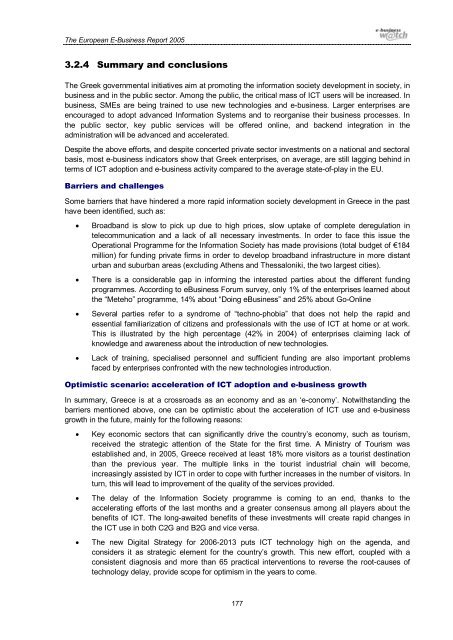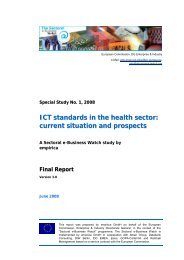The European e-Business Report The European e ... - empirica
The European e-Business Report The European e ... - empirica
The European e-Business Report The European e ... - empirica
You also want an ePaper? Increase the reach of your titles
YUMPU automatically turns print PDFs into web optimized ePapers that Google loves.
<strong>The</strong> <strong>European</strong> E-<strong>Business</strong> <strong>Report</strong> 2005<br />
3.2.4 Summary and conclusions<br />
<strong>The</strong> Greek governmental initiatives aim at promoting the information society development in society, in<br />
business and in the public sector. Among the public, the critical mass of ICT users will be increased. In<br />
business, SMEs are being trained to use new technologies and e-business. Larger enterprises are<br />
encouraged to adopt advanced Information Systems and to reorganise their business processes. In<br />
the public sector, key public services will be offered online, and backend integration in the<br />
administration will be advanced and accelerated.<br />
Despite the above efforts, and despite concerted private sector investments on a national and sectoral<br />
basis, most e-business indicators show that Greek enterprises, on average, are still lagging behind in<br />
terms of ICT adoption and e-business activity compared to the average state-of-play in the EU.<br />
Barriers and challenges<br />
Some barriers that have hindered a more rapid information society development in Greece in the past<br />
have been identified, such as:<br />
• Broadband is slow to pick up due to high prices, slow uptake of complete deregulation in<br />
telecommunication and a lack of all necessary investments. In order to face this issue the<br />
Operational Programme for the Information Society has made provisions (total budget of €184<br />
million) for funding private firms in order to develop broadband infrastructure in more distant<br />
urban and suburban areas (excluding Athens and <strong>The</strong>ssaloniki, the two largest cities).<br />
• <strong>The</strong>re is a considerable gap in informing the interested parties about the different funding<br />
programmes. According to e<strong>Business</strong> Forum survey, only 1% of the enterprises learned about<br />
the “Meteho” programme, 14% about “Doing e<strong>Business</strong>” and 25% about Go-Online<br />
• Several parties refer to a syndrome of “techno-phobia” that does not help the rapid and<br />
essential familiarization of citizens and professionals with the use of ICT at home or at work.<br />
This is illustrated by the high percentage (42% in 2004) of enterprises claiming lack of<br />
knowledge and awareness about the introduction of new technologies.<br />
• Lack of training, specialised personnel and sufficient funding are also important problems<br />
faced by enterprises confronted with the new technologies introduction.<br />
Optimistic scenario: acceleration of ICT adoption and e-business growth<br />
In summary, Greece is at a crossroads as an economy and as an ‘e-conomy’. Notwithstanding the<br />
barriers mentioned above, one can be optimistic about the acceleration of ICT use and e-business<br />
growth in the future, mainly for the following reasons:<br />
• Key economic sectors that can significantly drive the country’s economy, such as tourism,<br />
received the strategic attention of the State for the first time. A Ministry of Tourism was<br />
established and, in 2005, Greece received at least 18% more visitors as a tourist destination<br />
than the previous year. <strong>The</strong> multiple links in the tourist industrial chain will become,<br />
increasingly assisted by ICT in order to cope with further increases in the number of visitors. In<br />
turn, this will lead to improvement of the quality of the services provided.<br />
• <strong>The</strong> delay of the Information Society programme is coming to an end, thanks to the<br />
accelerating efforts of the last months and a greater consensus among all players about the<br />
benefits of ICT. <strong>The</strong> long-awaited benefits of these investments will create rapid changes in<br />
the ICT use in both C2G and B2G and vice versa.<br />
• <strong>The</strong> new Digital Strategy for 2006-2013 puts ICT technology high on the agenda, and<br />
considers it as strategic element for the country’s growth. This new effort, coupled with a<br />
consistent diagnosis and more than 65 practical interventions to reverse the root-causes of<br />
technology delay, provide scope for optimism in the years to come.<br />
177

















